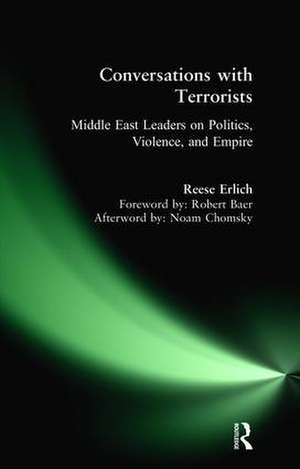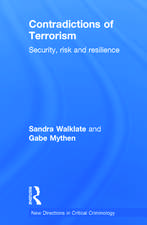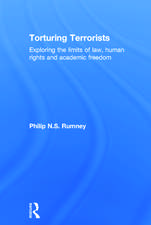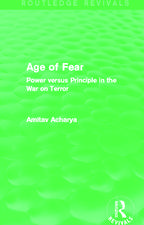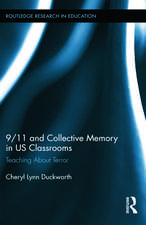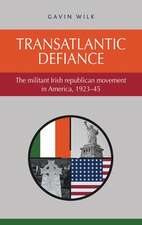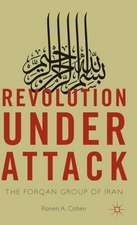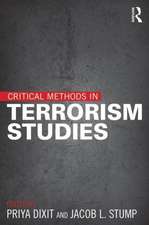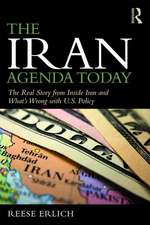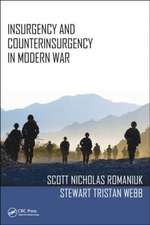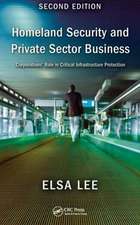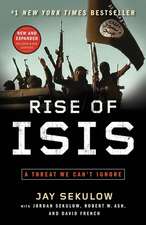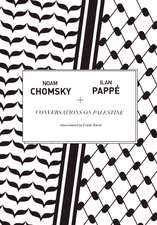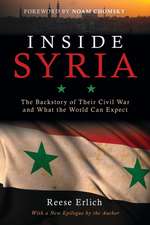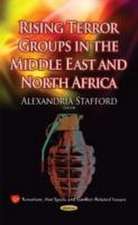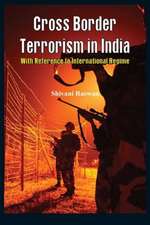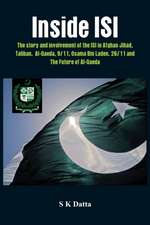Conversations with Terrorists: Middle East Leaders on Politics, Violence, and Empire
Autor Reese Erlich, Baer Roberten Limba Engleză Hardback – 21 aug 2017
Veteran journalist Reese Erlich offers them a chance to explain key issues and to respond to charges leveled by the United States. Critiquing these responses and synthesizing a broad range of material, Erlich shows that yesterday’s terrorist is today’s national leader, and that today’s freedom fighter may become tomorrow’s terrorist. He concludes that the global war on terror has diverted public attention from the war’s real goal—expanding U.S. influence and interests in the Middle East—and offers policy remedies.
| Toate formatele și edițiile | Preț | Express |
|---|---|---|
| Paperback (1) | 237.11 lei 6-8 săpt. | |
| Taylor & Francis – 15 sep 2010 | 237.11 lei 6-8 săpt. | |
| Hardback (1) | 1040.94 lei 6-8 săpt. | |
| Taylor & Francis – 21 aug 2017 | 1040.94 lei 6-8 săpt. |
Preț: 1040.94 lei
Preț vechi: 1404.21 lei
-26% Nou
Puncte Express: 1561
Preț estimativ în valută:
199.23€ • 207.09$ • 165.04£
199.23€ • 207.09$ • 165.04£
Carte tipărită la comandă
Livrare economică 04-18 februarie 25
Preluare comenzi: 021 569.72.76
Specificații
ISBN-13: 9781138467880
ISBN-10: 113846788X
Pagini: 191
Dimensiuni: 138 x 216 mm
Greutate: 0.45 kg
Ediția:1
Editura: Taylor & Francis
Colecția Routledge
Locul publicării:Oxford, United Kingdom
ISBN-10: 113846788X
Pagini: 191
Dimensiuni: 138 x 216 mm
Greutate: 0.45 kg
Ediția:1
Editura: Taylor & Francis
Colecția Routledge
Locul publicării:Oxford, United Kingdom
Public țintă
General, Postgraduate, and UndergraduateRecenzii
"Erlich efficiently unearths some of the most problematic and overlooked narratives about terrorism."
—Publishers Weekly, Starred Review
“Conversations with Terrorists takes us inside the minds of people sometimes labeled as enemies by successive U.S. governments. Rather than relying on State Department or Pentagon sources, Erlich interviews key Middle East players and presents their unvarnished views. Some have acted despicably; none of them are described as ‘terrorists’ by U.S. officials. A must read for anyone who wants to understand the phony War on Terror.”
—Daniel Ellsberg, Secrets: A Memoir of Vietnam and the Pentagon Papers
“Since I was present at two of these conversations with terrorists, I feel fully qualified to tell you that book you’re holding is true, accurate, thoughtful, and eminently readable. I would expect no less of a man who would walk up to Khalil Meschal, the head of Hamas, at a Syrian embassy reception and ask for an interview. He got it. I traveled with Reese from the Souks of Damascus to the killing grounds of Al Sukariya near Iraq, where we investigated a secret U.S. raid together. It was like traveling with a pit-bull who is trailing a truck of raw meat. Reese locks on to an objective and will not be deterred until he has unpacked and deconstructed it from at least seven angles.”
—Peter Coyote, Sleeping Where I Fall
“In an era when the Bush Administration has defined the world as good vs. evil, it’s great to read a book that reminds you things aren’t all black and white, but rather shades of grey. Conversations with Terrorists shows you that the term terrorist is subjective and that one man’s freedom fighter is another man’s terrorist.”
—Maz Jobrani, comedian/actor/American citizen
“One of the most courageous journalists I know.”
—Amiri Baraka (aka LeRoiJones), poet/playwright/political activist
“What is terror? A word. What is in that word terror? Reese Erlich introduces us to people whose names are associated with that word. He gives them the chance to speak. When we listen, we find ourselves provoked by unexpected insights and challenges to our stereotypes.”
—Stephen Kinzer, All the Shah’s Men
“Reese Erlich is an investigative reporter par excellence: fearless, dogged, and someone who can’t be snowed. Plus, he’s a great writer.”
—Matthew Rothschild, editor, The Progressive
—Publishers Weekly, Starred Review
“Conversations with Terrorists takes us inside the minds of people sometimes labeled as enemies by successive U.S. governments. Rather than relying on State Department or Pentagon sources, Erlich interviews key Middle East players and presents their unvarnished views. Some have acted despicably; none of them are described as ‘terrorists’ by U.S. officials. A must read for anyone who wants to understand the phony War on Terror.”
—Daniel Ellsberg, Secrets: A Memoir of Vietnam and the Pentagon Papers
“Since I was present at two of these conversations with terrorists, I feel fully qualified to tell you that book you’re holding is true, accurate, thoughtful, and eminently readable. I would expect no less of a man who would walk up to Khalil Meschal, the head of Hamas, at a Syrian embassy reception and ask for an interview. He got it. I traveled with Reese from the Souks of Damascus to the killing grounds of Al Sukariya near Iraq, where we investigated a secret U.S. raid together. It was like traveling with a pit-bull who is trailing a truck of raw meat. Reese locks on to an objective and will not be deterred until he has unpacked and deconstructed it from at least seven angles.”
—Peter Coyote, Sleeping Where I Fall
“In an era when the Bush Administration has defined the world as good vs. evil, it’s great to read a book that reminds you things aren’t all black and white, but rather shades of grey. Conversations with Terrorists shows you that the term terrorist is subjective and that one man’s freedom fighter is another man’s terrorist.”
—Maz Jobrani, comedian/actor/American citizen
“One of the most courageous journalists I know.”
—Amiri Baraka (aka LeRoiJones), poet/playwright/political activist
“What is terror? A word. What is in that word terror? Reese Erlich introduces us to people whose names are associated with that word. He gives them the chance to speak. When we listen, we find ourselves provoked by unexpected insights and challenges to our stereotypes.”
—Stephen Kinzer, All the Shah’s Men
“Reese Erlich is an investigative reporter par excellence: fearless, dogged, and someone who can’t be snowed. Plus, he’s a great writer.”
—Matthew Rothschild, editor, The Progressive
Cuprins
Chapter 1 Will the Real Terrorists Please Stand Up?; Chapter 2 Hamas’s Khaled Meshal: MiddleEast’s Most Wanted; Chapter 3 Geula Cohen: Jewish Terrorist?; Chapter 4 Syria’s President Bashar al-Assad: State Sponsor of Terrorism?; Chapter 5 Lebanon’s Grand Ayatollah Mohammad Fadlallah: CIA Victim; Chapter 6 Mohsen Sazegara, Terrorist Governments, and Iran’s Democracy Movement; Chapter 7 Mohammad Nizami: The Taliban’s Golden Voice; Chapter 8 Media Distortions, Obama’s Policies, and Ending the Waron Terrorism; afterword Afterword: Terrorism and Empire;
Descriere
Drawing on original research and firsthand interviews, Conversations with Terrorists offers critical portraits of six Middle Eastern leaders often labeled as terrorists: Syrian president Bashar Al-Assad, Hamas top leader Khaled Meshal, Israeli politician Geula Cohen, Iranian Revolutionary Guard founder Mohsen Sazargara, Hezbollah spiritual advisor Grand Ayatollah Mohammed Fadlallah, and former Afghan Radio and Television Ministry head Malamo Nazamy.
Veteran journalist Reese Erlich offers them a chance to explain key issues and to respond to charges leveled by the United States. Critiquing these responses and synthesizing a broad range of material, Erlich shows that yesterday’s terrorist is today’s national leader, and that today’s freedom fighter may become tomorrow’s terrorist. He concludes that the global war on terror has diverted public attention from the war’s real goal—expanding U.S. influence and interests in the Middle East—and offers policy remedies.
Veteran journalist Reese Erlich offers them a chance to explain key issues and to respond to charges leveled by the United States. Critiquing these responses and synthesizing a broad range of material, Erlich shows that yesterday’s terrorist is today’s national leader, and that today’s freedom fighter may become tomorrow’s terrorist. He concludes that the global war on terror has diverted public attention from the war’s real goal—expanding U.S. influence and interests in the Middle East—and offers policy remedies.
